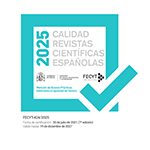The validity of Prometheus as ethical paradigm in "The Heretic", by Miguel Delibes
Abstract
The defence of religious freedom and, by extension, of freedom of thought, is the idea that led Miguel Delibes to write The Heretic, his last novel. In order to develop this subject, the narrator uses the mythologem of the rebel who, spurred by an imperative of reason or his own morals, dares to go beyond the limits allowed by law and, as a consequence, must face hard punishment. The large number of episodes and symbolic elements related to the image of the Titan in his version of tragic hero justifies, in my view, an approach from the myth to this highly praised but seldom studied novel. This contribution will detail how the main mythemes of Aeschylus’ Prometheus – rebellion, philanthropy, freedom, endurance… – are assimilated from the viewpoint of Christian humanism and to what extent they express, beyond religion, their status of objective values in contrast to the relativistic concepts about human being and also in contrast to the new threat of fundamentalism.Downloads
Article download
License
Amaltea. Revista de mitocrítica is an open access journal which means that all content is freely available without charge to the user or his/her institution. Users are allowed to read, download, copy, distribute, print, search, or link to the full texts of the articles in this journal without asking prior permission from the publisher or the author. This is in accordance with the BOAI definition of open access."Full-text articles published in Amaltea. Revista de mitocrítica are open-access and published under a CreativeCommons License Attribution-NonCommercial-NoDerivatives 4.0 International (CC BY-NC-ND 4.0) http://creativecommons.org/licenses/by-nc-nd/4.0/deed.en. Reproduction, distribution or public communication of these articles with commercial purposes requires the Editor’s prior written. Redistribution for academic purposes is permitted, provided that the source and authorship are properly acknowledged, and that the journal is credited with the first publication, by adding a link to the journal's official URL. If available, the DOI of the article in question should also be included.













